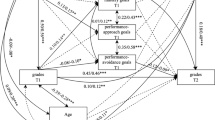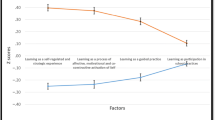Abstract
Value orientations are believed to influence learning in school. We assume that this influence is mediated by the valences attached to specific school subjects. In a questionnaire study (704 students from 36 classes) achievement and well-being value orientations were measured. Students also rated valence scales for the school subjects German and Mathematics and reported their respective grades. In order to take into consideration the nested data structure, the mediation hypotheses were tested using the Hierarchical Linear Model in a series of intercept only models. School grades were significantly predicted by value orientation. A mediation analysis indicated that this relation was completely mediated by the valences of the different school subjects.
Résumé
Les orientations valeurs sont supposées influencer l’apprentissage. Nous croyons que cette influence est médiate par les valences des disciplines scolaires. Dans un sondage (704 étudiants de 36 classes) les orientations des valeurs de réussite et de bien-être ont été mesurées. En outre, les étudiants ont indiqué leur valence pour les disciplines d’allemand et de mathématique et communiqué leurs notes respectives. Pour tenir compte de la structure imbriquée des dates, les hypothèses médiatiques ont été analysées en utilisant le Modéle Hiérarchique Linéaire avec des models intercept-only. Les notes ont été prédites de façon significative par les orientations valeur. L’analyse de médiation indique une dépendance strictement médiate par les valences des différentes disciplines scolaires.
Similar content being viewed by others
References
Baron, R.M., & Kenny, D.A. (1986). The moderator-mediator variable distinction in social psychological research: Conceptual, strategic, and statistical considerations.Journal of Personality and Social Psychology, 51, 1173–1182.
Boehnke, K. (2005). Value orientations in relation to mathematical self-esteem: An exploratory study of their role in mathematical achievement among German, Israeli, and Canadian 14-year-olds.European Journal of Psychology of Education, 20, 227–241.
Boekaerts, M. (2003). Adolescence in Dutch culture: A self-regulation perspective. In F. Pajares & T. Urdan (Eds.),Adolescence and education: International perspectives on adolescence and education (vol. 3, pp. 102–124). Greenwich, CT, Information Age Publishing.
Bollen, K., & Lennox, R. (1991). Conventional wisdom on measurement: A structural equation perspective.Psychological Bulletin, 110, 305–314.
Brendl, C.M., & Higgins, E.T. (1996). Principles of judging valence: What makes events positive or negative? In M.P. Zanna (Ed.),Advances in experimental social psychology (vol. 28, pp. 95–160). San Diego, CA: Academic Press.
Bubeck, M., & Bilsky, W. (2004). Value structure at an early age.Swiss Journal of Psychology, 63, 31–41.
Cantor, N. (1994). Life task problem solving: Situational affordances and personal needs.Personality and Social Psychology Bulletin, 20, 235–243.
Deci, E.L., & Ryan, R.M. (Eds.), (2002).Handbook of self-determination research. Rochester, New York: University of Rochester Press.
Eccles, J.S., & Wigfield, A. (2002). Motivational beliefs, values, and goals.Annual Review of Psychology, 53, 109–132.
Fazio, R.H. (2001). On the automatic activation of associated evaluations: An overview.Cognition and Emotion, 15, 115–141.
Feather, N.T. (1988). Values, valences, and course enrollment: Testing the role of personal values within an expectancyvalence framework.Journal of Educational Psychology, 80, 381–391.
Feather, N.T. (1990). Bridging the gap between values and actions: Recent applications of the expectancy-value model. In E.T. Higgins & R.M. Sorrentino (Eds.),Handbook of motivation and cognition: Foundations of social behavior (vol. 2, pp. 151–192). New York: Guilford Press.
Feather, N.T. (1995). Values, valences, and choice: The influence of values on the perceived attractiveness and choice of alternatives.Journal of Personality and Social Psychology, 68, 1135–1151.
Feather, N.T. (1999).Values, achievement, and justice: Studies in the psychology of deservingness. New York: Kluwer Academic/Plenum.
Fries, S., Schmid, S., Dietz, F., & Hofer, M. (2005). Conflicting values and their impact on learning.European Journal of Psychology of Education, 20, 259–273.
Graham, J.W., Cumsille, P.E., & Ekek-Fisk, E. (2003). Methods for handling missing data. In J.A. Schinka & W.F. Velicer (Eds.),Methods in Psychology (pp. 87–114). New York: John Wiley & Sons.
Greenfield, P.M., Keller, H., Fuligni, A., & Maynard, A. (2003). Cultural pathways through universal development.Annual Review of Psychology, 54, 461–490.
Himmelfarb, S. (1993). The measurement of attitudes. In A.H. Eagly & S. Chaiken (Eds.),The psychology of attitudes (pp. 23–87). Forth Worth, TX: Harcourt Brace Jovanovich.
Hitlin, S., & Piliavin, J.A. (2004). Values: Reviving a dormant concept.Annual Review of Sociology, 30, 359–393.
Hofer, M., & Peetsma, T. (2005). Societal values and school motivation. Students’ goals in different life domains. Introduction to the special issue.European Journal of Psychology of Education, 20, 203–208.
Hofer, M., Schmid, S., Fries, S., Dietz, F., Clausen, M., & Reinders, H. (2007). Individual values, motivational conflicts, and learning for school.Learning and Instruction, 17, 17–28.
Inglehart, R. (1997).Modernization and postmodernization. Princeton, NJ: Princeton University Press.
Inglehart, R., & Baker, W.E. (2000). Modernization, cultural change, and the persistence of traditional values.American Sociological Review, 65, 19–51.
Kenny, D.A., Kashy, D.A., & Bolger, N. (1998). Data analysis in social psychology. In D. Gilbert, S.T. Fiske, & G. Lindzey (Hrsg.),Handbook of social psychology (4th ed., vol. 1, pp. 233–265). New York: McGraw-Hill.
Kenny, D.A., Korchmaros, J.D., & Bolger, N. (2003). Lower level mediation in multilevel models.Psychological Methods, 8, 115–128.
Kessels, U. (2005). Fitting into the stereotype: How gender-stereotyped perceptions of prototypic peers relate to liking of school subjects.European Journal of Psychology of Education, 20, 309–323.
Krull, J.L., & MacKinnon, D.P. (2001). Multilevel modeling of individual and group level mediated effects.Multivariate Behavioral Research, 26, 249–277.
Lens, W., Lacante, M., Vansteenkiste, M., & Herrera, D. (2005). Study persistence and academic achievement as a function of the type of competing motivational tendencies.European Journal of Psychology of Education, 20, 275–287.
Lewin, K. (1951).Field theory in social science: Selected theoretical papers by Kurt Lewin (D. Cartwright, Ed.), New York: Harper & Row.
Maio, G.R., & Olson, J.M. (2000). What is a “value-expressive” attitude? In G.R. Maio & J.M. Olson (Eds.),Why we evaluate: Functions of attitudes (pp. 249–269). Mahwah, NJ: Erlbaum.
Maio, G.R., Olson, J.M., Bernard, M.M., & Luke, M.A. (2003). Ideologies, values, attitudes, and behavior. In J. DeLamater (Eds.),Handbook of social psychology (pp. 283–308). New York: Plenum.
Marini, M.M. (2000). Social norms and values. In E.F. Borgatta & R.J.V. Montgomery (Eds.),Encyclopedia of sociology (pp. 2828–2840). New York: Macmillan.
Oviada, S. (2003). Suggestions of the postmodern self: Value changes in American high school students, 1976–1996.Sociological Perspectives, 46, 239–256.
Pansu, P., Bressoux, P., & Louche, C. (2003). Theory of the social norm of internality applied to education and organizations. In N. Dubois (Ed.),A social cognitive approach to social norms (pp. 195–230). London: Routledge.
Raudenbush, S.W., & Bryk, A.S. (2002).Hierarchical lienar models: Applications and data analysis methods. (2nd ed.), Thousand Oaks, CA: Sage.
Raudenbush, S.W., Bryk, A.S., Cheong, Y.F., & Cogdon, R.T. (2000).HLM 5: Hierarchical linear and nonlinear modeling. Lincolnwood, IL: Scientific Software International, Inc.
Rokeach, M. (1973).The nature of human values. New York: Free Press.
Rubin, D.B. (1987).Multiple imputation for nonresponse in surveys. New York: Wiley.
Schiefele, U. (1999). Interest and learning from text.Scientific Studies of Reading, 3, 257–280.
Schmid, S., Hofer, M., Dietz, F., Reinders, H., & Fries, S. (2005). Value orientations and everyday action conflicts: An interview study.European Journal of Psychology of Education, 20, 243–258.
Schwartz, S.H. (1992). Universals in the content and structure of values: Theory and empirical test in 20 countries. In M. Zanna (Ed.),Advances in experimental social psychology (vol. 25, S. 1–65). New York: Academic Press.
Schwartz, S.H., Melech, G., Lehmann, A., Burgess, S., Harris, M., & Owens, V. (2001). Extending the cross-cultural validity of the theory of basic human values with a different method of measurement.Journal of Cross-Cultural Psychology, 32, 519–542.
Seligman, C., Olson, J.M., & Zanna, M.P. (Eds.), (1996).The psychology of values: The Ontario Symposium (vol. 8). Mahwah, NJ: Erlbaum.
Shafer, J.L. (1999). NORM: Multiple imputation of incomplete multivariate data under a normal model, version 2 [Computer Software for Windows 95/98/NT]. Retrieved January 12, 2005 from http://www.stat.psu.edu/~jls/misoftwa.html.
Sobel, M.E. (1982). Amsymptotic confidence intervals for indirect effects in structural equation models. In S. Leinhardt (Ed.),Sociological methodology (pp. 290–312). San Francisco: Jossey-Bass.
Streiner, D.L. (2003). Being inconsistent about consistency: When coefficient alpha does and doesn’t matter.Journal of Personality Assessment, 80, 217–222.
Urdan, T. (Ed.), (1999).Advances in motivation and achievement: The role of context (vol. 11). Stamford, CT: JAI Press.
Verplanken, B., & Holland, R.W. (2002). Motivated decision making: Effects of activation and self-centrality of value on choices and behavior.Journal of Personality and Social Psychology, 82, 434–447.
Weber, M. (1949).Max Weber on the methodology of the social sciences (E.A. Shils & H.A. Finch, Eds. & Trans.). New York: Free Press.
Wigfield, A., & Eccles, J. (2000). Expectancy-value theory of achievement motivation.Contemporary Educational Psychology, 25, 68–81.
Author information
Authors and Affiliations
Corresponding author
Additional information
The study presented in this paper was supported by the research Grant HO 649/17-1 by the German Research Foundation.
Rights and permissions
About this article
Cite this article
Fries, S., Schmid, S. & Hofer, M. On the relationship between value orientation, valences, and academic achievement. Eur J Psychol Educ 22, 201–216 (2007). https://doi.org/10.1007/BF03173522
Received:
Revised:
Issue Date:
DOI: https://doi.org/10.1007/BF03173522




